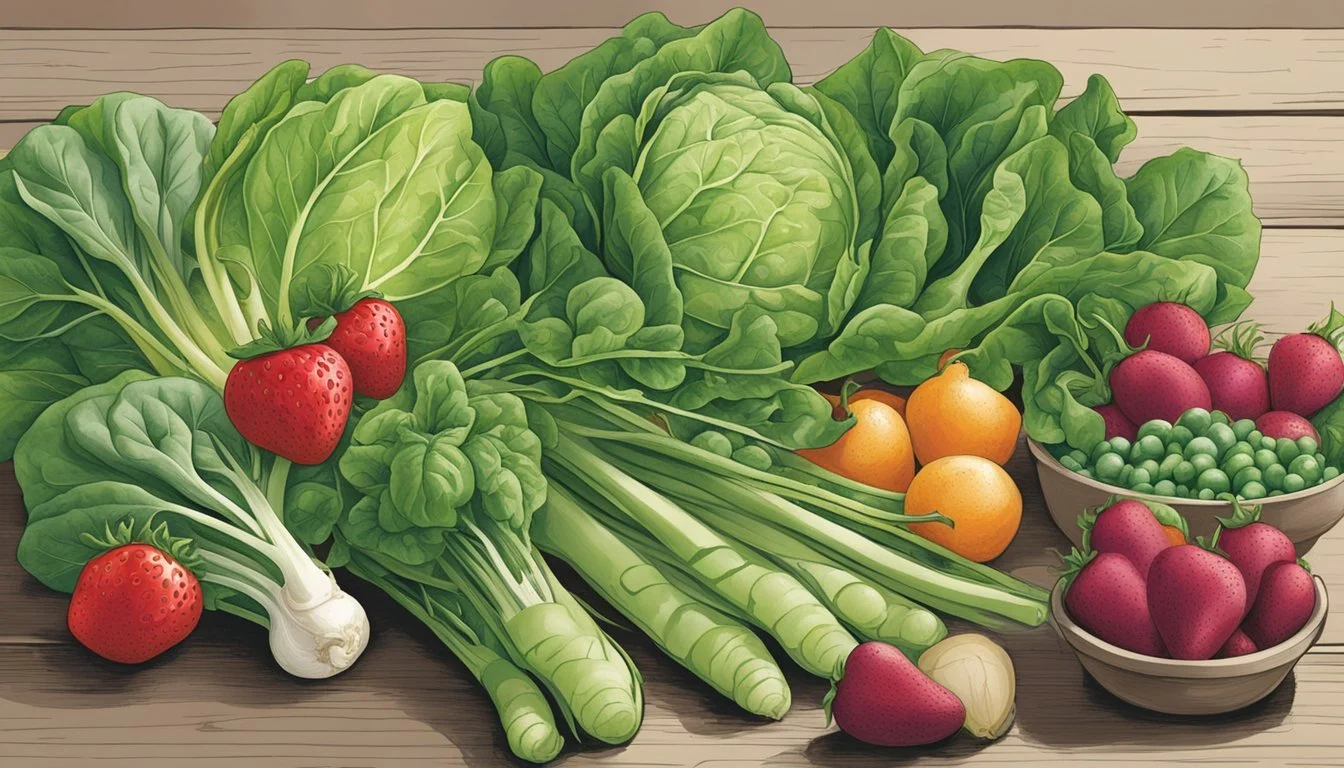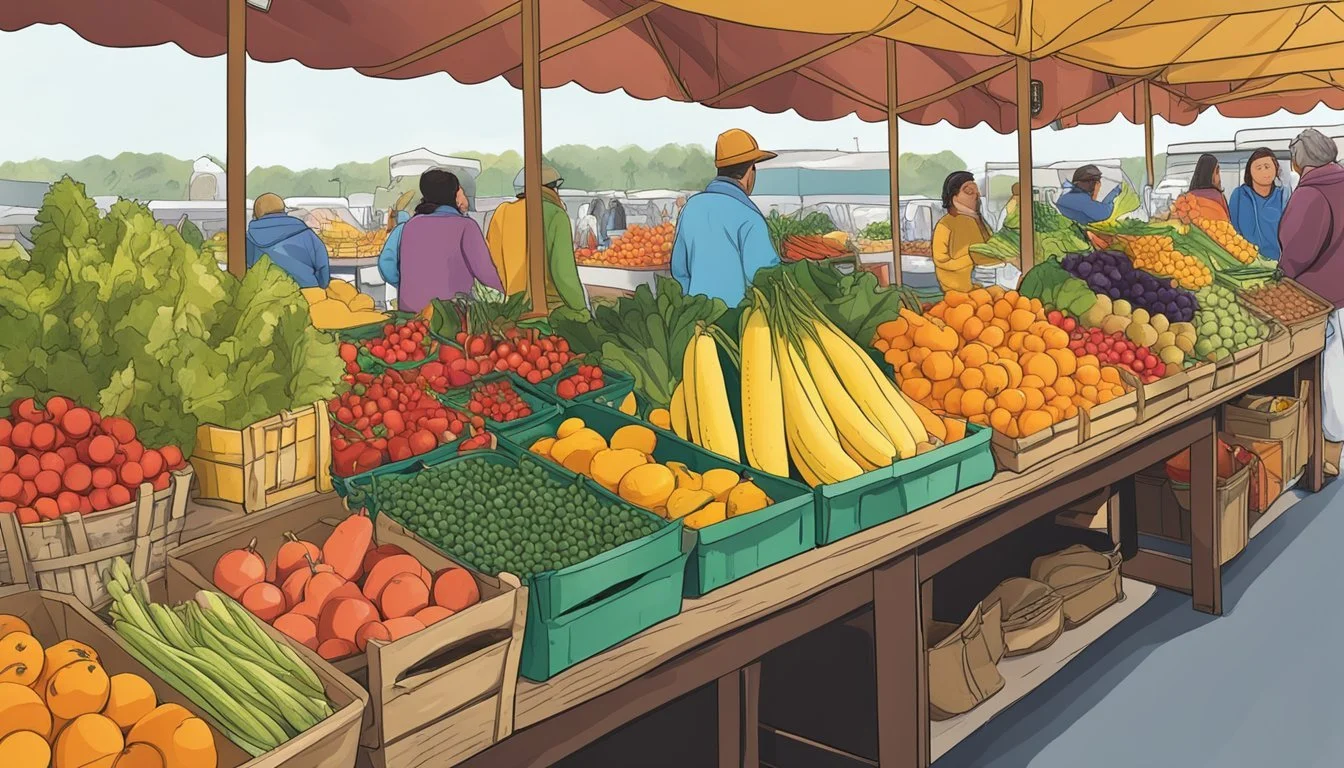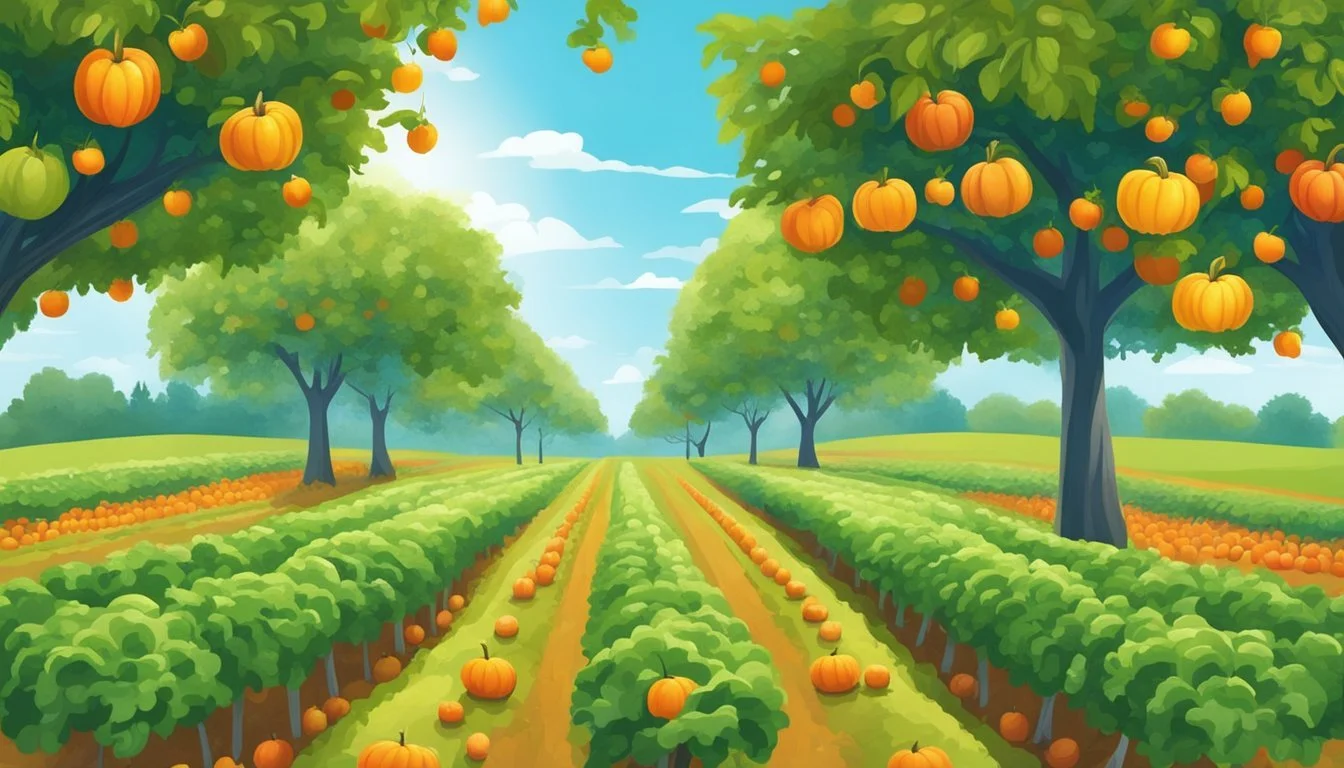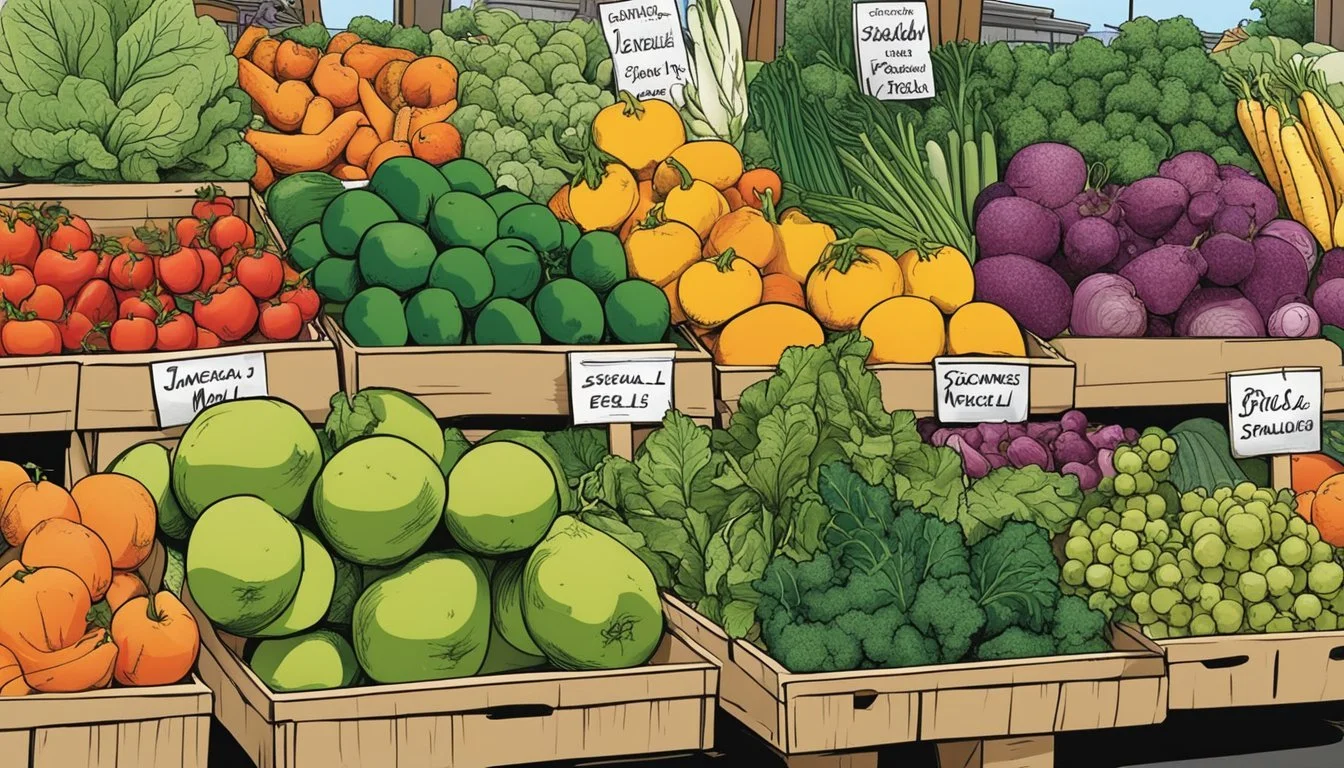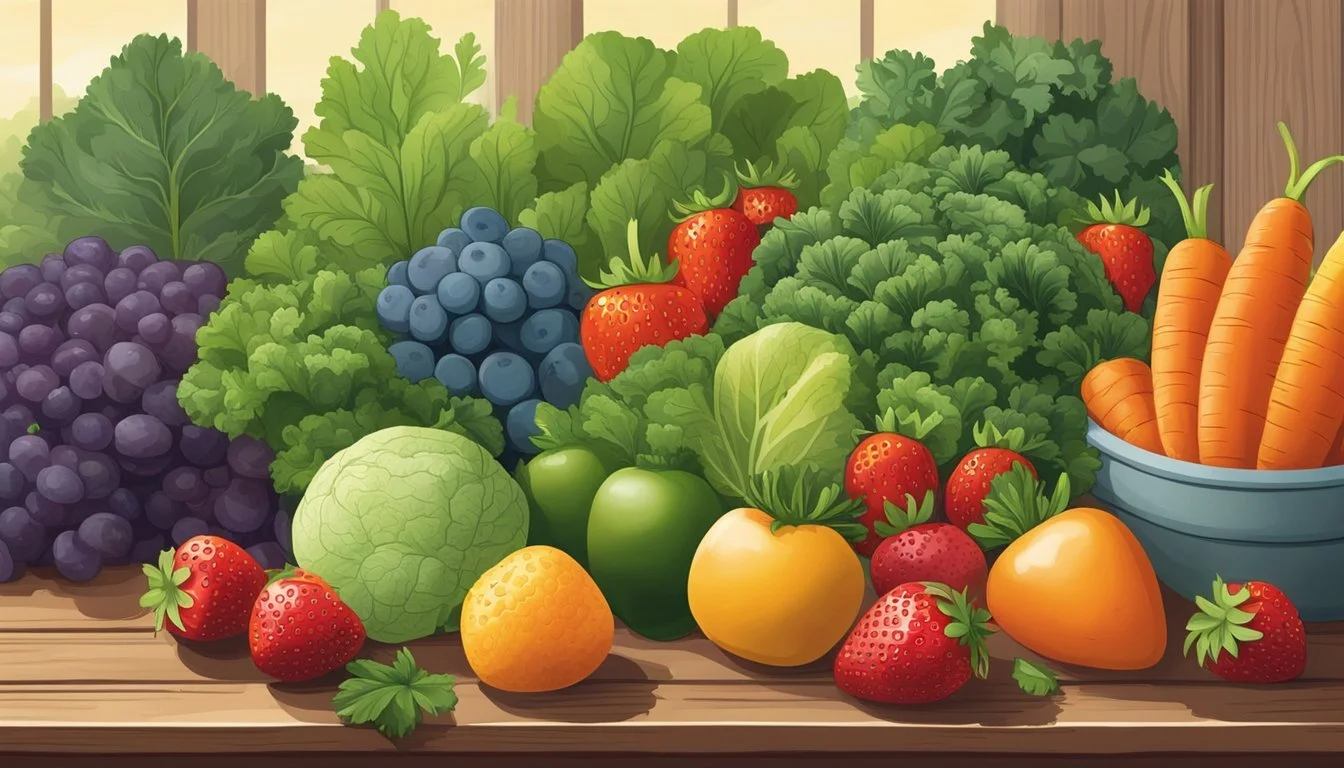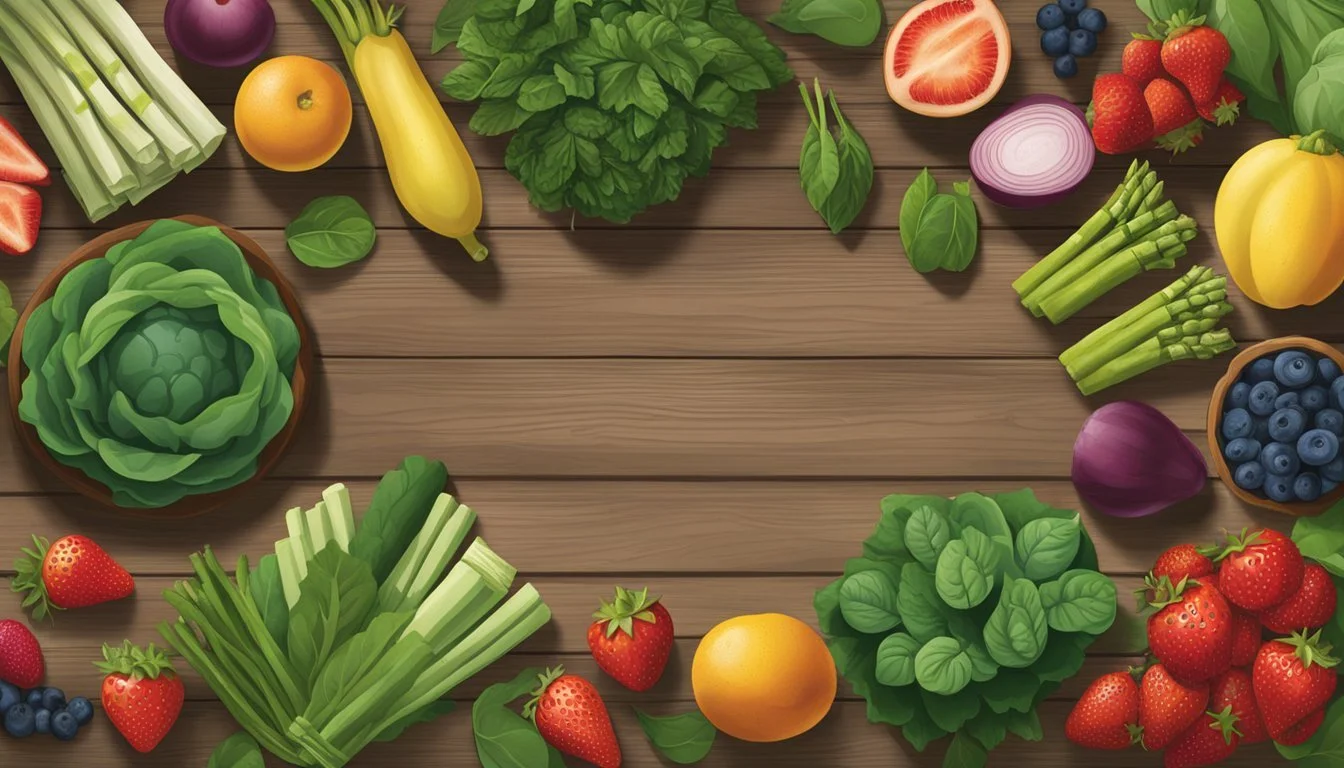Rhode Island Seasonal Fruit & Vegetables in March
Your Guide to Fresh Produce
This Article is Part of our Rhode Island Seasonal Fruit & Veg Calendar
As winter wanes, Rhode Island greets March with a quiet yet promising transition in its agricultural calendar. The Ocean State's local farms begin to yield a variety of produce that not only promise freshness but also the revival of flavors synonymous with the approaching spring season. This period marks a time when residents and chefs alike can start to explore the emerging bounty that Rhode Island's fertile lands have to offer.
During March in Rhode Island, the fields and greenhouses slowly come to life, offering a selection of vegetables that withstand the cool, early spring temperatures. Cruciferous vegetables like broccoli (how long does broccoli last?) and cabbage continue to thrive, alongside root vegetables such as carrots (how long do carrots last?) and parsnips, which are often sweetened by the frost. The season also introduces a fresh wave of greens, including arugula (how long does arugula last?) and spinach, which are known for their versatility in the kitchen.
Local markets start to showcase these seasonal offerings, reflecting Rhode Island's commitment to sustainable farming and community-supported agriculture. Consumers have the opportunity to indulge in the robust flavors of March's produce while supporting the local economy. The freshness of the season's harvest not only enhances the culinary experience but also ensures nutrient-rich options for health-conscious individuals. The availability of these foods speaks to the state's agricultural resilience and the adaptability of its producers, confirming that even in the earliest days of spring, Rhode Island's harvest can be both abundant and inspiring.
Understanding Rhode Island's Growing Seasons
Rhode Island's growing seasons reflect a transition from the dormancy of winter to the awakening of spring. This period is critical for farmers and gardeners in setting the stage for the year's agricultural production.
Transitioning from Winter to Spring
As Rhode Island moves from the colder months into March, the shift from winter to spring begins to manifest. Farming activities gradually recommence, although frost can still pose a risk to tender plants. Farmers and gardeners take into account the average last frost date to plan the start of their planting season. Typically, they will begin to harden off transplants—acclimating them to outdoor conditions—over several days to prepare for planting.
Monthly Weather Patterns and Their Impact
Weather patterns in March in Rhode Island can fluctuate dramatically, impacting farming and gardening plans.
Early March often retains winter's chill, and snow can occur.
As the month progresses, warmer days emerge, hinting at spring's arrival.
Despite the increasing daylight, frost is common, and temperatures can dip below freezing at night.
Farmers must monitor these patterns closely to protect their crops from weather fluctuations.
The Farming Calendar in Rhode Island
The farming calendar in Rhode Island is tailored to the state's unique climate zones and seasonal changes. In March, the focus is on preparing for sowing and planting as the ground thaws and becomes workable. Here's a brief overview of March activities:
Indoor seeding: Starting seeds indoors for summer crops like tomatoes, peppers, and eggplants.
Soil preparation: Tilling and enriching the soil with compost and other amendments as it becomes accessible.
Cool-season crops: Planting hardy vegetables such as peas, spinach, and lettuce that can tolerate the cooler temperatures of early spring.
These activities are guided by historical weather data and forecasts, allowing farmers to optimize their crop success.
March Produce Overview
March signals the transition from winter to spring in Rhode Island, bringing a variety of fresh produce to local markets. As the days grow longer and the soil thaws, an array of vegetables and fruits come into season, offering vibrant flavors and nutritional benefits.
Vegetables in Season
In March, one can find an assortment of vegetables that thrive in the cool yet changing temperatures:
Leafy Greens: Kale and spinach are robust during this time, providing iron and essential vitamins.
Root Vegetables: Carrots and beets, which have been in the ground over winter, are sweet and tender.
Cruciferous Vegetables: Look for Brussels sprouts (how long do brussels sprouts last?)and cabbage, known for their healthful properties.
These vegetables are not only fresh but also offer versatility in the kitchen, from salads to heartier cooked dishes.
Fruits Available in March
While March is not known for a wide variety of fruits, Rhode Island does see some fresh, seasonal offerings:
Apples: Stored from fall, they remain crisp and can be used in both sweet and savory dishes.
Pears: Like apples, cold storage pears are still available and offer a sweet touch to many recipes.
Although the fruit selection is limited, these fruits add freshness to the diet and can still be enjoyed in a number of culinary applications.
Key Vegetables to Look for
March in Rhode Island offers a selection of cold-hardy vegetables that start to flourish as the winter wanes. Community supported agriculture (CSAs), farmers' markets, and home gardens begin to feature these robust varieties.
Leafy Greens and Herbs
Spinach, kale, and an assortment of spring greens become readily available in March. They remain resilient during the unpredictable cool snaps of early spring. Rhode Island gardeners often have success with varieties such as:
Spinach: Savoy, Flat Leaf
Kale: Curly, Lacinato
Mixed Greens: Includes mustard greens, arugula, and mizuna
Herbs also start to thrive during this time, with parsley and cilantro being particularly noteworthy for their cold tolerance and ability to add fresh flavors to early spring dishes.
Herb Description Parsley Widely used, this herb is cold-tolerant and can add a fresh taste to many dishes. Cilantro Known for its unique flavor, it's often used in salsas and as a garnish.
Root Vegetables and Cruciferous Varieties
Moving on to root vegetables, carrots and potatoes become accessible. Rhode Island's soil temperatures start to increase, allowing these vegetables to steadily grow.
Carrots: Often enjoyed for their sweet flavor and crisp texture.
Potatoes: Valued for their versatility and are a staple in many diets.
The cruciferous vegetables, namely cabbage, cauliflower (how long does cauliflower last?), broccoli, and Brussels sprouts, are essential during this period. They are known for their health benefits and are a part of the staple diet for many Rhode Islanders during early spring. These vegetables are able to withstand the frost, a common trait that ensures their availability in March.
Cruciferous Vegetables:
Cabbage: It is hearty and can be used in a variety of dishes, from salads to slow-cooked meals (how long do cooked meals last?).
Cauliflower: Becoming increasingly popular as a low-carb alternative in recipes.
Broccoli: An excellent source of vitamins and can be eaten raw or cooked.
Brussels Sprouts: When roasted, they take on a nutty flavor that makes them a favorite among locals.
Fruit Harvest
In March, Rhode Island's cool climate influences the availability of locally grown fruit. The focus shifts to the last of storage crops like apples and pears, while preparations for the coming berry season are underway.
Locally Grown Tree Fruit
Apples: March marks the end of apple harvest season, with late-storage varieties still available. These apples, kept in controlled environments, retain their crispness and flavor.
Varieties: Look for storage Empire, Fuji, and Granny Smith.
Pears: Much like apples, pears harvested in the previous fall remain available. Careful storage allows them to be enjoyed well into March.
Varieties: Common late-storage pears include Bosc and D'Anjou.
Early Berries and Exotic Selections
March is not typically known for fresh berries in Rhode Island due to the cold weather, but greenhouses and imports begin to bring in early or exotic fruit selections.
Berries: Anticipation for local berries grows, with strawberry planting underway for a late spring harvest.
Exotic fruits: Markets may start to feature imported fruits such as kiwis and figs to complement the waning local fruit availability.
Farmers' Market Guide
Rhode Island offers a diverse selection of markets where shoppers can find fresh produce in March. The key to sourcing the freshest fruits and vegetables is to visit local farmers' markets and farm stands, which pride themselves on offering goods often picked the same day.
Finding the Freshest Produce
Patrons seeking the freshest produce should look to the numerous farmers' markets that operate on a regular basis throughout Rhode Island. South Kingstown Farmers Market, for instance, is open on Saturdays from 9 am to 12:30 pm at Independence Square, operating through March and beyond. These markets often provide a variety of seasonal, local produce, which is typically fresher than what one might find at grocery stores.
Local Farm Stands and Their Offerings
At local farm stands, customers can expect to find a selection of produce that is not only fresh but also reflective of what is in season in Rhode Island. In March, offerings may include root vegetables, like carrots and potatoes, and various leafy greens. Below is a table of potential fresh offerings at Rhode Island farm stands in March:
Produce Farm Stand Carrots South Kingstown Market Potatoes South Kingstown Market Leafy Greens South Kingstown Market
Farm stands like those at the South Kingstown Farmers Market provide not only fresh produce but also the opportunity to support local farmers and the agricultural economy. Shoppers can utilize cash, credit/debit, and even EBT or WIC at many of these stands, making fresh produce accessible to a wider range of individuals.
Eating with the Seasons
Embracing seasonal eating in March means enjoying the freshest produce that Rhode Island offers, with benefits stretching from superior flavor to nutritional richness.
Benefits of Seasonal Eating
Consumers who choose seasonal fruits and vegetables tend to enjoy fresher, tastier, and more nutritious produce. Freshness is a hallmark of seasonal eating, as locally sourced produce often travels a shorter distance to reach consumers, retaining its flavor and nutrients better than out-of-season, long-haul counterparts. A diet rich in seasonal produce aligns with the natural harvesting cycle, which can encourage more diversity in one's diet and support local economies.
March Specialties in Rhode Island
In March, Rhode Island's local farms and markets offer an array of fresh, raw vegetables that are not only full of flavor but also packed with health benefits. Some of the specialties to look for include:
Arugula: Peppery and crisp, perfect for a fresh salad.
Carrots: Sweet and crunchy, ideal both raw or cooked.
Broccoli: Deep green and hearty, suited for a range of dishes from stir-fries to soups.
The table below illustrates some key crops available in Rhode Island during March:
Vegetable Flavor Profile Suggested Use Arugula Peppery Salads, sandwiches Carrots Sweet Snacking, roasting Broccoli Earthy, hearty Soups, stir-fries, roasting
These selections represent a glimpse of what consumers can enjoy while adhering to a philosophy of seasonal eating, thereby partaking in the best Rhode Island has to offer during early spring.
Supporting Local Agriculture
In Rhode Island, supporting local agriculture is crucial for maintaining a sustainable food system. Seasonal produce, delivered fresh from local farms, ensures a robust local economy and promotes health and wellness within the community.
Community Supported Agriculture (CSA) Programs
Community Supported Agriculture (CSA) programs allow residents to purchase a share of the harvest from local farms. Rhode Islanders can subscribe to these programs and receive regular deliveries of fresh, seasonal fruits and vegetables. By participating in CSA programs, individuals directly support local farmers, reduce the carbon footprint associated with long-distance transportation, and enjoy produce at its peak freshness and nutritional value.
Examples of produce available from local CSAs in March might include:
Root Vegetables: Carrots, beets, and potatoes
Leafy Greens: Spinach and kale
Alliums: Onions and garlic
Benefits of Buying Local
Buying local has several significant benefits for both the consumer and the community:
Economic Support: Money spent on local produce stays within the community and helps sustain the livelihoods of local farmers.
Freshness and Flavor: Local produce does not require long transport, often resulting in fresher and more flavorful food.
Environmental Impact: Local sourcing reduces the carbon footprint since the food travels shorter distances.
Community Health: Fresh produce contributes to a healthier diet, impacting overall community health positively.
Agriculture is a vital part of Rhode Island's economy, and supporting local farms through programs and consumer choices has beneficial ripple effects throughout the community. By selecting local options, individuals not only gain access to fresh, nutritious produce but also contribute to the state’s agricultural success and sustainability.
Recipes and Preparation Tips
In March, Rhode Island offers a variety of in-season produce that can be transformed into vibrant dishes. The preparation techniques discussed focus on elevating the fresh flavors and preserving the bountiful harvest.
Simple Dishes to Highlight Spring Flavors
For a fresh, simple salad, one can combine arugula, beets, and chives with a light vinaigrette to let the ingredients shine. Broccoli and cauliflower are perfect for roasting with a dash of olive oil, salt, and pepper, which brings out their natural sweetness and creates a satisfying caramelization.
For a comforting dish, try sautéing chopped leeks and collard greens (how long do collard greens last?) with garlic, then finish with a squeeze of lemon for a bright touch. These simple dishes ensure that the seasonal produce of Rhode Island can be enjoyed in its most flavorful state.
Preserving the Harvest: Canning and Pickling
Preservation by canning and pickling allows for the extension of March flavors into the remaining seasons. Beets are ideal for pickling; simmered in a mixture of vinegar, sugar, and spices, they can be jarred and sealed to retain their earthy flavor.
One can also preserve carrots and cauliflower in a similar fashion, by creating a brine of vinegar, water, salt, and an array of pickling spices (how long does pickling spice last?) like mustard seeds (how long do mustard seeds last?) and coriander. These pickled vegetables can elevate future meals with a tangy crunch and are perfect accompaniments to salads, sandwiches, and cheese plates.
Conclusion
Eating with the seasons is a practice that can significantly enhance the culinary experience, offering fresh, flavorful produce while supporting local agriculture. In March, Rhode Island offers a variety of seasonal produce that reflects the region's agricultural diversity. The cool yet temperate March climate allows for the growth of certain fruits and vegetables, which can be enjoyed at their peak freshness.
Fruits and Vegetables in Season in March:
Vegetables: Residents and chefs can look forward to a range of hardy vegetables. Included in March's offerings are:
Arugula
Beets
Broccoli
Cabbage
Carrots
Cauliflower
Kale
Leeks
Lettuce
Mushrooms
Peas
Radishes
Spinach
Turnips
Fruits: While fruit options are more limited during this early spring month, some storage apples and pears may still be available from the previous season's harvest.
It's important for consumers to remember that the exact availability of produce can vary based on factors such as weather patterns and farming practices. Therefore, it's advisable to consult with local farmers' markets or farm stands for the most accurate and current information. Engaging with local Rhode Island produce sources not only supports the local economy but also ensures that consumers are getting the freshest possible ingredients for their table.


